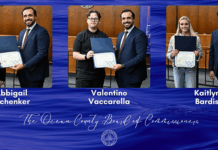
MANCHESTER – Members of the township’s Environmental Commission recently heard a report on Manchester’s most valuable resource – its environment.
The“Green Infrastructure Feasibility Study for Manchester Township” was discussed by its author Chris Obrupta, Extension Specialist in Water Resources, Rutgers Cooperative Extension Water Resources Program.
Obrupta said “part of our mission is to extend the university out to different communities in the state to help them with their problems and help improve their quality of life. I came to Rutgers 18 years ago and started the water resources program.”
“My job is to run around the state and help them solve their water problems. The project we are talking about today is really all about storm water runoff,” Obrupta said.
“As we add more development, we add more impervious surfaces,” which is any surface that water doesn’t pass through, such as the roof of a building, a roadway, the sidewalk or a driveway. “Under a natural condition, wooded conditions of New Jersey about 10% of the annual rainfall runs off,” he told the Commission.
“In New Jersey we get 44 to 46 inches a year. So about 10% of that would run off. We have single family homes on one or two acre lots you get 20% runoff. We have quarter to half acre lots you get 30% runoff and then in downtown areas where there is lots of development, we get 55% runoff,” Obrupta added.
“Several years ago, we looked at doing watershed restoration plans. What we realized was that they are beautiful plans but we only really used the last chapter of the plan that identifies where we can put in projects to address the storm water issues. The first thing we developed is these impervious surface assessments and we look at the land use data that we have from the state of New Jersey,” Obrupta said.
He noted that the DEP (Department of Environmental Protection) has a great geographic information system. “We could look at that and see how much impervious coverage there is in a town. We can calculate runoff levels from that impervious cover. We can look at your town of Manchester and see the different land uses that we have and its basic land uses which is agriculture, forest land, urban and wetlands.”
“We can look at the mixed sub water sheds in Manchester which is a fairly big town so there are a lot of waterways that the water drains to.,” Obrupta added.
Obrupta said the water needed to be managed by the watershed. Once you get beyond 2% of impervious coverage your waterways start to be impaired. Once you get to 10% impervious coverage your waterways are impaired. Once you get beyond 25% impervious coverage your waterways are severely impacted.”
Obrupta said the town as a whole has 6% of impervious cover. His report looked at areas that could be retrofitted with green infrastructure which manages runoff.
This is done “with things like rain gardens, asphalt, capturing water and reusing it, bioswales, ditches with plants in them.” Obrupta recommended several locations where there is a lot of grass and where gardens could be created.
Obrupta proposed that students at schools could be educated through the projects and could also be utilized “for free labor for the garden. They can plant it and it works out really nice to help us build these projects.”
He also recommended places of worship. “God wants us to save the planet so why not build a rain garden by a church? We have libraries which are great places. We can build a rain garden there and educate people at the same time.”
Commission Chair Rory Wells said the report had been sent to the mayor and council. “My recommendation would be that we pick one or two projects and start scouting for volunteers.”
In reference to a potential project at the township’s branch of the Ocean County Library, Wells acknowledged that as it is a county building, coordination would have to be made with county government. “I don’t foresee any problems with that.”
The study was prepared by the Rutgers Cooperative Extension Water Resources Program, with funding and direction from the William Penn Foundation and the New Jersey Agricultural Experiment Station, to highlight green infrastructure opportunities within Manchester.
The Environmental Commission thanked the William Penn Foundation and Manchester Township for their input and support in creating the document.
Also during that meeting, the Commission welcomed its newest member, Kristy Henry to the panel and after the presentation proposed a project that might partner them with the county’s library system.






